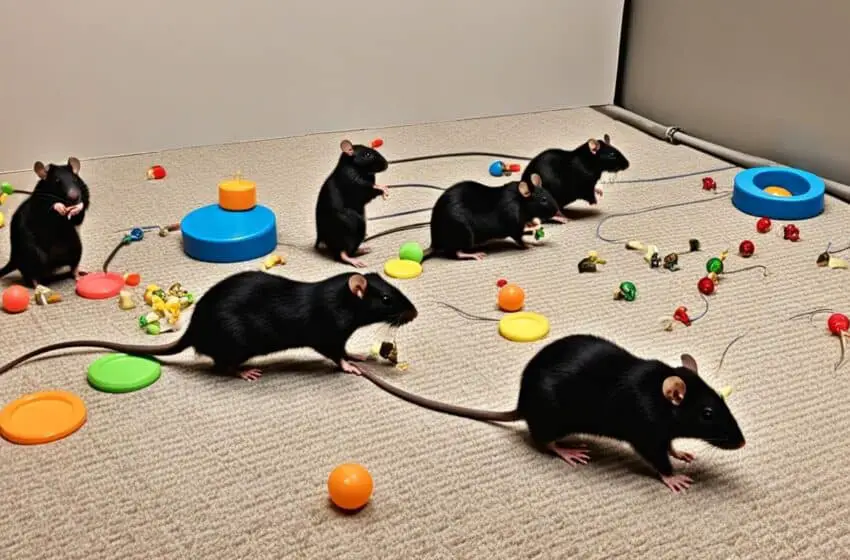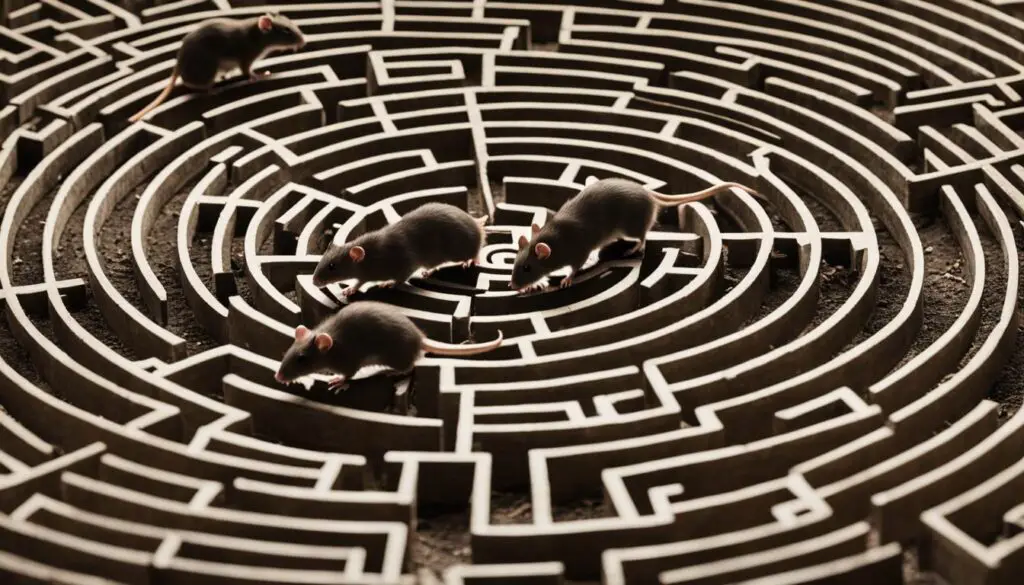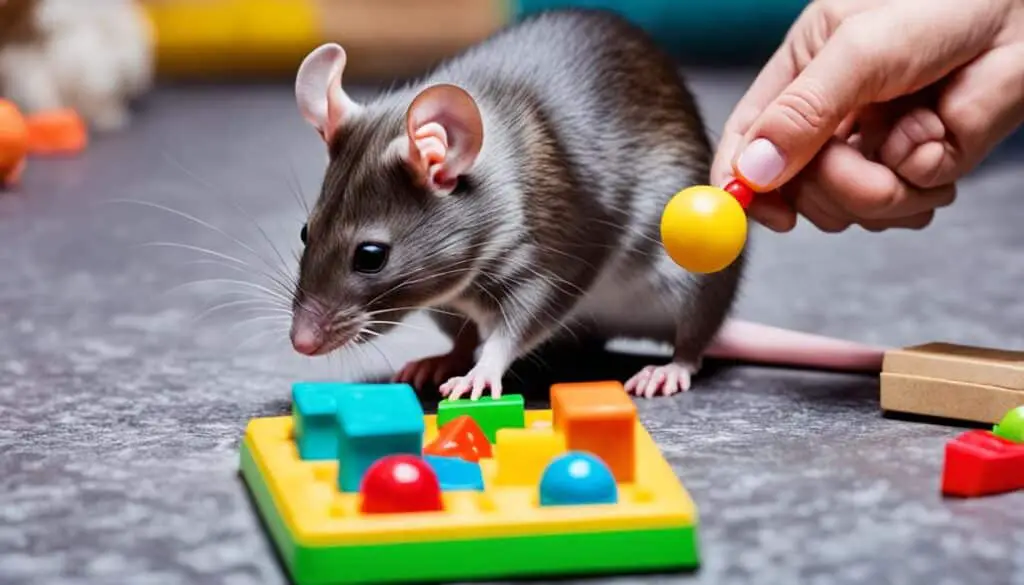Training Your Pet Rat: Effective Tips and Tricks

When it comes to training pet rats, there are several effective tips and tricks that can help enhance their skills, bonding, and intelligence. As a pet rat owner, I have discovered valuable insights from experts and experienced rat owners, which I am excited to share with you in this article.
Before we delve into the training tips, it is crucial to understand the behavior and psychology of pet rats. Rats are highly intelligent creatures with a natural curiosity. They form strong bonds with their human counterparts and thrive in social environments. By grasping their behavior patterns, we can develop effective training techniques that cater to their unique needs.
Key Takeaways:
- Training pet rats involves enhancing their skills, bonding, and intelligence.
- Understanding rat behavior and psychology is essential before starting the training process.
- Rats are highly intelligent creatures with a natural curiosity.
- They form strong bonds with their human owners.
- Effective training techniques cater to their unique needs and social nature.
Understanding Rat Behavior and Psychology
Before diving into training tips, it’s important to understand the behavior and psychology of pet rats. Rats are highly intelligent creatures with a natural curiosity. They are also social animals and form strong bonds with their human counterparts. Understanding their behavior and psychology can help in developing effective training techniques.
One key aspect of rat behavior is their intelligence. Rats have been shown to possess problem-solving skills and can quickly learn new tasks. Their curious nature allows them to explore their surroundings and seek out new experiences. This intelligence makes them trainable and receptive to learning new tricks and commands.
Rats are social animals that thrive on companionship. They enjoy interacting with humans and other rats, which makes them excellent pets for those seeking a furry companion. Building a strong bond with your pet rat is crucial for successful training. By establishing trust and creating a positive relationship, you can motivate them to cooperate and engage in training sessions.
Quote: “Rats are highly intelligent creatures with a natural curiosity.”
Rat psychology is influenced by their natural instincts and behaviors. Understanding these instincts can help tailor training methods to their specific needs. Rats have an innate desire to explore and investigate their environment. This can be harnessed during training by creating stimulating and enriching environments that encourage their natural curiosity.
Additionally, rats are motivated by rewards and positive reinforcement. Offering treats, praises, or playtime as rewards for desirable behaviors can encourage them to repeat those behaviors. Consistency and repetition are key when training rats, as it helps reinforce desired actions and solidify their understanding of commands.
Take into account the unique personality of each rat during training. Some rats may be more adventurous and eager to learn, while others may be more timid and require a gentler approach. By observing and understanding your rat’s individual behavior, you can tailor the training techniques to their specific needs and preferences.
Rat Behavior and Psychology at a Glance:
| Rat Behavior | Rat Psychology |
|---|---|
| Highly intelligent | Curious nature |
| Social animals | Form strong bonds with humans |
| Desire to explore | Motivated by rewards and positive reinforcement |
| Unique personalities | Individual behavior and preferences |

Positive Reinforcement Training
Positive reinforcement is a highly effective training technique for pet rats. By using this method, I can reward desirable behaviors with treats, praises, or interactive play, which helps to reinforce and encourage rats to repeat those behaviors.
Consistency and patience are crucial when using positive reinforcement training techniques. It’s important to provide clear and immediate rewards to help rats associate positive experiences with specific actions. This way, they are more likely to understand and remember what behavior is desired.
I recommend using small, bite-sized treats that are easily accessible and appetizing to rats as rewards. This ensures they receive immediate gratification for their good behavior.
Positive reinforcement training can be a fun and interactive experience for both the rat and the trainer. It helps to build a strong bond between them and makes the training process more enjoyable.
“Positive reinforcement is a powerful tool in rat training. By focusing on rewarding desirable behaviors, we can create a positive learning environment and strengthen the bond between the rat and the trainer.” – Dr. Jane Rodriguez, Animal Behavior Specialist
Here is an example of a simple positive reinforcement training session for a rat:
- Choose a desired behavior you want to teach, such as coming when called.
- Use a clicker or a verbal cue, such as saying “come,” followed by the rat’s name.
- When the rat responds correctly by coming to you, immediately reward them with a treat and praise.
- Repeat this process consistently, gradually reducing the use of the clicker or cue word until the rat comes reliably when called.
Positive reinforcement training is highly effective in shaping a rat’s behavior and can be used to teach various tricks and commands. It helps create a positive and happy training environment for the rats.
Clicker Training for Rats
Clicker training has gained popularity as an effective method for training pet rats. By using a clicker as a signal, you can mark the desired behavior and reinforce it with a reward. This technique helps rats associate the sound of the clicker with positive outcomes, making them more likely to repeat the desired actions.
One of the key advantages of clicker training is its versatility. You can use this method to teach rats a wide range of tricks and commands, such as coming when called or performing agility exercises. The clicker provides a clear and consistent signal, facilitating effective communication between you and your rat.
When starting clicker training with your rat, begin with a simple behavior and a rewards-based system. For example, you might want to teach your rat to touch a target with their nose. Here’s how you can do it:
- Step 1: Hold the target, such as a small stick or pen, near your rat.
- Step 2: When your rat touches the target with their nose, immediately click the clicker to mark the behavior.
- Step 3: Follow the click with a small reward, such as a treat or a brief play session.
- Step 4: Repeat this process several times, gradually reinforcing the behavior.
As your rat becomes more comfortable with the clicker training, you can introduce more complex behaviors and commands. Remember to keep the training sessions short and frequent to maintain your rat’s engagement and motivation.
“Clicker training has been a game-changer for me and my pet rats. It has allowed us to communicate effectively and build a strong bond. The sound of the clicker has become a signal for them to perform, and it’s incredible to see how quickly they learn new tricks!”
Benefits of Clicker Training
Clicker training offers several benefits for both rat owners and their furry friends. Here are some of the advantages:
- Clear Communication: The clicker provides a precise and consistent signal, making it easier for rats to understand and learn new behaviors.
- Enhanced Bonding: Clicker training strengthens the bond between rats and their owners through positive reinforcement and interactive sessions.
- Faster Learning: Rats quickly associate the sound of the clicker with rewards, which accelerates their learning process.
- Increased Confidence: As rats successfully perform trained behaviors, their confidence grows, leading to more adventurous and daring actions.
By incorporating clicker training into your rat’s training routine, you can create a fun and rewarding experience for both of you. It’s a powerful tool that taps into your rat’s intelligence and natural curiosity, unlocking their full potential.

Enrichment and Playtime for Rats
Enrichment and playtime are vital aspects of caring for pet rats. These activities not only keep them physically and mentally stimulated but also foster a stronger bond between rats and their owners. By providing a variety of toys, tunnels, and puzzles, you can ensure that your rats have a fulfilling environment that promotes their well-being.
Engaging in interactive play sessions with your rats is not only entertaining but also contributes to their overall development. By incorporating play into their training routine, you can help them learn new skills and reinforce positive behaviors.
Playing with rats not only provides enjoyment but also offers the following benefits:
- Stimulation: Playtime stimulates rats’ minds and prevents boredom, which can lead to destructive behaviors.
- Bonding: Spending quality time with your rats during play sessions helps strengthen the bond between you and your furry companions.
- Exercise: Playtime provides rats with physical exercise, promoting a healthy weight and preventing obesity-related issues.
To ensure a fulfilling playtime experience, consider the following tips:
- Variety of Toys: Provide a range of toys that encourage rats to explore and engage in different activities. This can include chew toys, balls, tunnels, and ropes.
- Puzzle Toys: Introduce puzzle toys that require rats to figure out how to obtain treats or rewards. This stimulates their problem-solving skills and keeps them mentally sharp.
- Obstacle Courses: Set up an obstacle course using cushions, tunnels, and ramps, which challenges rats to navigate through the course. This provides both mental and physical stimulation.
- Fetch and Retrieve: Teach your rats to fetch small objects and return them to you. This not only provides exercise but also strengthens their bond with you through positive reinforcement.
Remember, playtime should always be supervised, ensuring the safety of your rats and the environment. Taking the time to interact and engage in play with your rats is not only enjoyable for them but also a rewarding experience for you as a pet owner.
Conclusion
In conclusion, training pet rats can be a rewarding experience for both the owner and the rat. By understanding their behavior and psychology, I can tailor my training approach to suit their needs.
Using positive reinforcement techniques, such as rewards and praises, helps to reinforce desirable behaviors and build a stronger bond with my pet rat. Consistency and patience are key, as rats learn at their own pace.
Incorporating clicker training into my rat’s training routine has proven to be effective. The clicker serves as a clear signal for the desired behavior, and the association between the sound and the reward helps my rat to learn new tricks and commands.
Enrichment and playtime are also crucial aspects of rat training. Providing a stimulating environment with toys, tunnels, and interactive play sessions not only keeps my rat mentally and physically active but also contributes to their overall well-being.
FAQ
What are some effective training tips for pet rats?
Effective training tips for pet rats include positive reinforcement, clicker training, and providing enrichment and playtime.
How can I understand the behavior and psychology of pet rats?
Understanding the behavior and psychology of pet rats can be done by studying their natural curiosity and social nature, and by learning from experts and experienced rat owners.
What is positive reinforcement training for rats?
Positive reinforcement training involves rewarding desirable behaviors with treats, praises, or interactive play to encourage rats to repeat those behaviors.
How does clicker training work for rats?
Clicker training for rats involves using a clicker to mark the desired behavior, followed by a reward. The rats learn to associate the sound of the clicker with the reward, making it an effective training method.
Why is enrichment and playtime important for rats?
Enrichment and playtime are essential for the overall well-being of rats. They stimulate their minds, prevent boredom, and help build a stronger bond with their owners.
Source Links
- https://deal.town/bugmd/16-hours-left-buy-3-get-3-free-PKNVYCDTE
- https://newsrnd.com/life/2024-01-07-"it-s-evil–yuck"–why-did-a-follower-come-out-on-einav-bublil—-voila!-celebs.Hy3b5x_Oa.html
- https://www.theguardian.com/tv-and-radio/2024/jan/07/tv-tonight-should-this-andrew-tate-documentary-even-have-been-made



